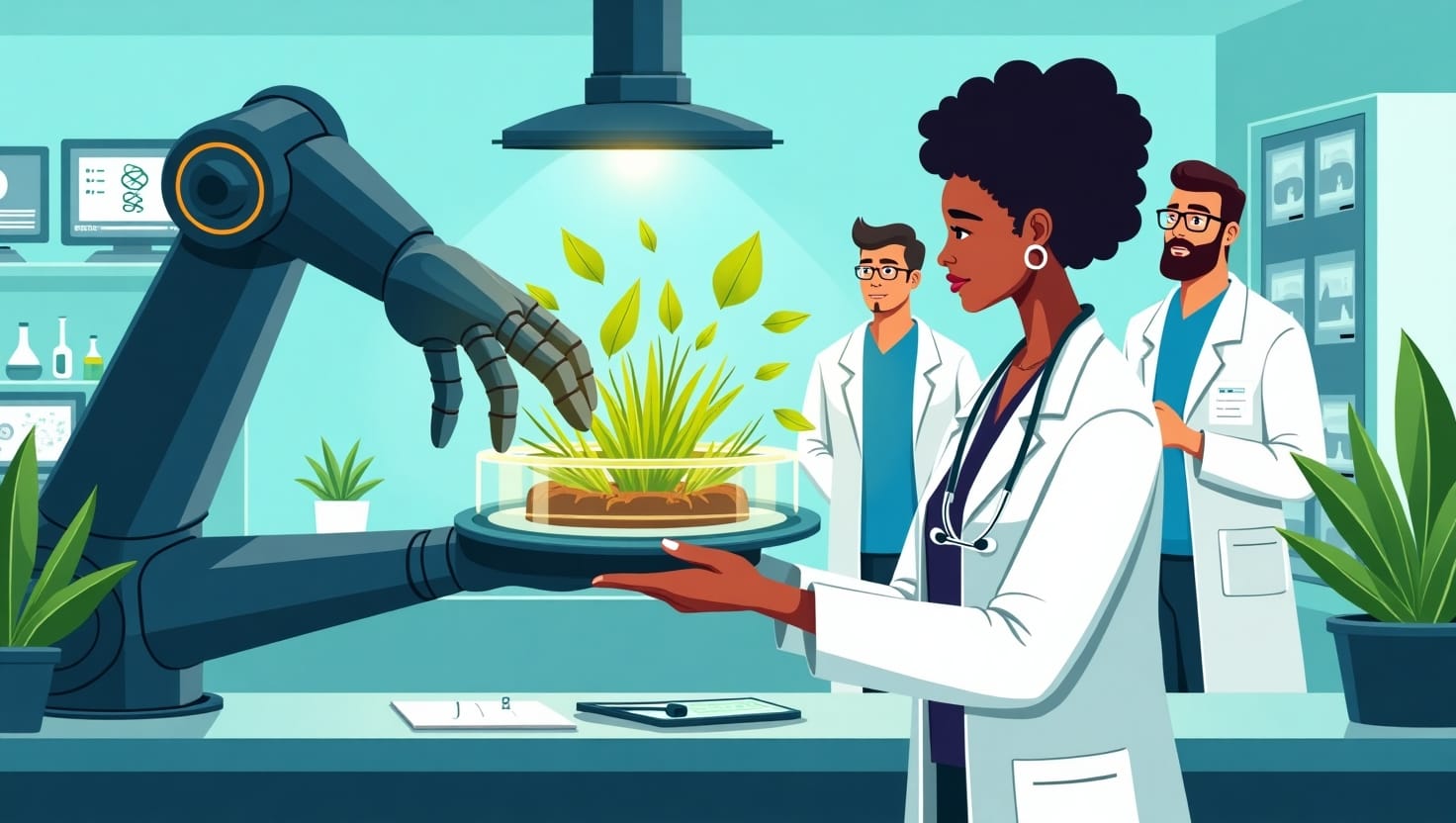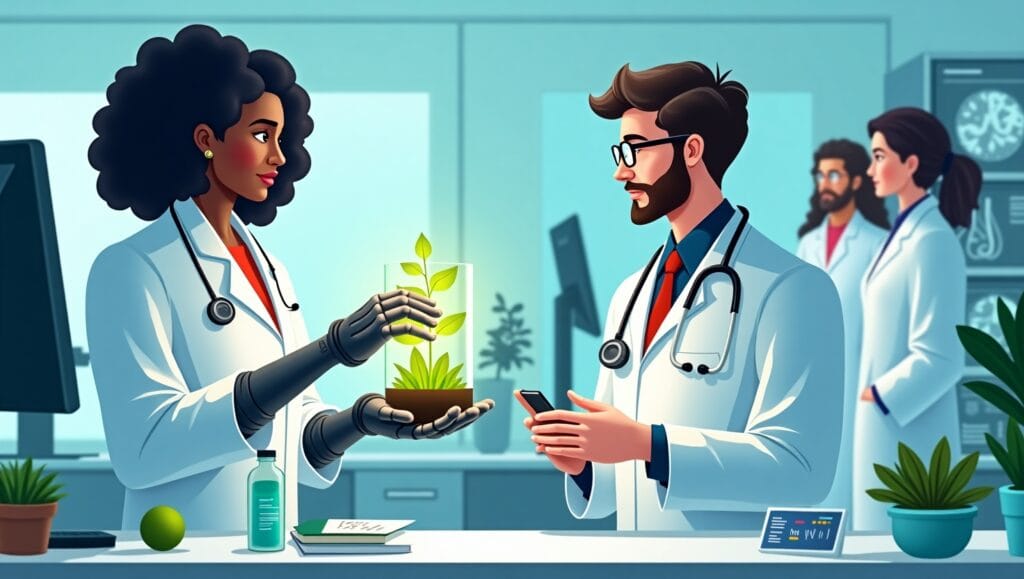
Introduction: The New Era of Biotechnology
As we move into 2025, biotechnology integration is no longer just a buzzword — it’s a global transformation.
From genetically engineered crops that can withstand climate change to AI-powered biotech tools detecting diseases before symptoms appear, the fusion of science, data, and innovation is reshaping agriculture and healthcare at an unprecedented pace.
Global biotech investment is projected to exceed $1.5 trillion by 2030, with precision agriculture and personalized medicine at the forefront. The question is no longer “if” these technologies will redefine our lives — but how fast.
1. Agriculture 4.0: AI Meets Genetic Engineering
Biotechnology is revolutionizing farming in ways that were science fiction a decade ago:
- CRISPR-Edited Crops
Plants are now designed with built-in resistance to pests and extreme weather, cutting pesticide use by up to 70%.
Keyword: CRISPR agriculture 2025 - AI-Powered Soil Analytics
Sensors and machine learning algorithms can now read soil nutrient profiles in real time, guiding precision fertilization. - Biofertilizers and Microbial Solutions
Engineered microbes are replacing chemical fertilizers, enriching soil health naturally.
By 2025, countries like the US, Brazil, and India are leading with large-scale biotech crop trials, boosting yields by 30–50% while reducing environmental damage.
2. Next-Gen Healthcare: Biotechnology + AI Diagnostics
The integration of biotechnology in healthcare is redefining disease prevention, diagnosis, and treatment.
- Personalized Gene Therapies
CRISPR and mRNA advancements now allow treatments to be tailored to a patient’s genetic blueprint. - AI-Powered Early Detection
Wearables and smart biosensors analyze blood, saliva, and breath to predict disease onset weeks before symptoms. - Bioprinting Organs
3D-bioprinting technology, fueled by biotechnology breakthroughs, is making custom organ replacement a near-term reality.
Keyword: AI biotech healthcare 2025
3. Sustainable Food Systems
Biotechnology is a driving force in solving global food security challenges:
- Lab-Grown Meat — scalable and more affordable than ever, reducing reliance on livestock farming.
- Algae-Based Protein — nutrient-rich and eco-friendly, offering a sustainable meat alternative.
- Plant Molecular Farming — growing vaccines inside edible plants like lettuce.
The World Health Organization predicts biotech-enhanced food systems could reduce global hunger by 25% in the next decade.
4. Climate-Resilient Farming
The climate crisis has pushed biotech innovation into overdrive:
- Drought-tolerant maize, salt-resistant rice, and UV-resistant berries are being field-tested worldwide.
- Gene-edited crops reduce water needs by up to 40%, offering hope to regions facing chronic drought.
5. Digital Twins in Healthcare
A game-changing biotech integration in 2025 is the use of digital twin technology — virtual replicas of human organs and systems that allow doctors to simulate treatments before applying them in real life.
Benefits include:
- Safer drug trials
- Reduced medical errors
- Personalized treatment plans in days instead of months
6. Ethical & Regulatory Challenges
Biotechnology integration also raises global ethical questions:
- Who owns genetically modified seeds?
- How do we ensure equal access to gene therapies?
- What safeguards prevent misuse of genetic editing in humans?
Global policymakers are now pushing for standardized biotech regulations to ensure innovations benefit all.
7. The Road Ahead: By 2030
By 2030, biotechnology is expected to integrate seamlessly into everyday life:
- AI-enhanced hospital diagnostics as a standard
- Fully autonomous biotech farms feeding entire cities
- Genetic editing to eliminate certain inherited diseases
The biotech revolution is not coming — it’s already here, and 2025 is the tipping point.
In the 21st century, few scientific fields have had as profound and widespread an impact as biotechnology integration. From genetically modified crops in agriculture to engineered living cells in medicine, biotechnology is reshaping the way we live, eat, and heal.
The integration of biotechnology across sectors is not just a passing trend — it’s a global transformation with far-reaching implications for food security, sustainability, climate adaptation, and personalized healthcare.
Why Biotechnology Integration Matters Now More Than Ever
The global biotechnology market was valued at over $1.55 trillion in 2023 and is projected to grow at a CAGR of more than 13% from 2024 to 2030. This growth is being driven by:
- Increasing demand for sustainable food production
- Advances in genetic engineering
- Rising prevalence of chronic diseases
- Breakthroughs in AI-driven biotech solutions
Governments, corporations, and research institutions are investing heavily to integrate biotech innovations into everyday life.
Agricultural Biotechnology Integration: The Rise of Smart and Sustainable Farming
1. Genetically Modified (GM) Crops
One of the earliest and most transformative applications of biotechnology is in genetically engineered crops. These crops are designed to:
- Resist pests and diseases
- Tolerate drought and extreme climates
- Enhance nutritional value
Case Studies:
- Bt Cotton: Reduced pesticide use by over 50% in India, boosting farmer income and reducing environmental pollution.
- Golden Rice: Engineered to produce beta-carotene, helping combat vitamin A deficiency in developing nations.
- DroughtGard Maize: Developed in the U.S. to withstand prolonged drought conditions, ensuring food supply stability.
These innovations have not only increased crop yields but also reduced the dependency on harmful chemical pesticides.
2. Precision Farming and AI Integration
The marriage of AI, IoT, and biotechnology has ushered in the era of precision farming. This includes:
- Biosensors for real-time soil and crop health monitoring
- Drones for high-resolution crop imaging
- Satellite-based analytics for predictive yield forecasts
- Targeted irrigation and fertilization to minimize waste
Impact Example: In the Netherlands, precision farming has allowed greenhouse farms to produce 10 times more food per acre than traditional farming methods, while using 90% less water.
This data-driven agriculture helps farmers adapt to climate change while meeting the rising global food demand. productivity with lower environmental impact, helping farmers adapt to climate change while meeting global food demands.

Healthcare Biotechnology Integration: Medicine Enters the Genetic Era
1. Personalized Medicine
Biotechnology is enabling tailor-made treatments based on a patient’s unique genetic makeup. This includes:
- Custom drug formulations based on DNA
- Predictive diagnostics for hereditary diseases
- Targeted cancer therapies with fewer side effects
Example: The drug Herceptin is prescribed only to breast cancer patients with a specific genetic marker (HER2-positive), improving treatment success rates while avoiding unnecessary exposure for others.
2. Engineered Living Therapeutics
A cutting-edge frontier in biotechnology involves living medicines — genetically engineered microbes or cells designed to detect, respond to, or treat diseases inside the body.
Examples include:
- Bacterial therapies for gut microbiome balance
- Gene therapy to correct defective DNA sequences
- Cell-based treatments for autoimmune disorders and rare diseases
This approach is game-changing for conditions previously considered incurable.
Societal and Ethical Considerations
While the promise of biotech is massive, it raises critical ethical questions:
- Are GM foods safe for long-term consumption?
- Who owns and controls genomic data?
- How do we prevent misuse of gene-editing tools like CRISPR?
Global Action:
Countries are setting up biotech ethics councils and international safety protocols to ensure responsible innovation.
Read more: AI for Life
Economic and Global Impact
Biotechnology integration has the potential to:
- Boost GDP through high-tech jobs in biotech research and manufacturing
- Improve public health, reducing healthcare costs
- Enhance global trade in biotech-enabled agriculture
For instance, the U.S. biotech industry employs over 1.8 million people and contributes more than $500 billion annually to the economy.
The Road Ahead: Integrated Bio-Intelligence
The future lies in the fusion of biotech and digital technologies, leading to Bio-Intelligence:
- AI-driven drug discovery
- Blockchain-secured genetic data
- DNA-based data storage systems
- Synthetic biology for bio-based materials and fuels
By 2035, experts predict biotech-enabled smart cities where bioengineered plants clean air, self-healing materials repair buildings, and personal health AI assistants monitor genetic changes in real time.
🌱 Biotechnology in Agriculture: Feeding the Future
Biotechnology in 2025 is going far beyond traditional GM crops. Advanced gene-editing tools like CRISPR-Cas9 are enabling scientists to design crops that are drought-resistant, pest-resistant, and nutrient-enriched — without compromising flavor or yield.
Key Agricultural Breakthroughs:
- Climate-Resilient Crops: New wheat and rice strains that thrive in extreme temperatures, safeguarding global food supply.
- Bio-Fertilizers: Microbe-based soil enhancers that boost crop productivity while cutting chemical usage by 50%.
- Precision Agriculture with AI: Drones and smart sensors integrated with biotech analytics to monitor crop health in real-time.
The result? Higher yields, lower costs, and a smaller environmental footprint — crucial for a world facing both population growth and climate change.
🧬 Biotechnology in Healthcare: Cures Once Thought Impossible
2025 marks a turning point where biotech isn’t just treating symptoms — it’s targeting root causes of diseases. Personalized medicine, powered by genetic sequencing, is making healthcare more precise than ever.
Key Healthcare Breakthroughs:
- Cell & Gene Therapies: Curing genetic disorders like sickle cell anemia at the DNA level.
- Bioprinting Organs: 3D-printed tissues and organs reducing transplant waiting times.
- mRNA Vaccines Beyond COVID: Custom mRNA vaccines fighting cancer and rare diseases.
- Microbiome Medicine: Tailoring treatments based on a patient’s gut bacteria composition.
These advancements are shifting the healthcare model from reactive care to proactive prevention.
🌍 Global Impact: Bridging Agriculture & Healthcare
The integration of biotechnology in agriculture and healthcare is reshaping economies, creating jobs, and reducing inequality. In rural communities, biotech-driven farming can boost income while biotech-driven health initiatives improve life expectancy.
- Agri-Health Nexus: Nutritious, biotech-enhanced crops can directly combat malnutrition-related illnesses.
- Sustainable Development Goals (SDGs): Biotechnology supports food security, good health, and environmental sustainability.
⚠️ Challenges to Address
While the potential is massive, challenges remain:
- Ethical debates over genetic modifications.
- Regulatory hurdles across different countries.
- Public acceptance and trust in biotech products.
The path forward will require transparency, public engagement, and global collaboration to ensure biotech benefits everyone.
Conclusion
Biotechnology is no longer confined to laboratories — it’s now in our farms, hospitals, homes, and even digital devices. Its integration into agriculture, healthcare, and environmental systems marks a new era of innovation that’s both high-tech and deeply human-centric.
Balancing breakthroughs with ethical responsibility will ensure that biotechnology becomes a force for global good.
Stay informed on the latest biotech and AI innovations — only at USAtrends.tech





